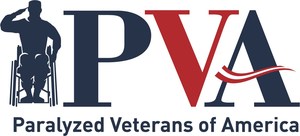Paralyzed Veterans of America Executive Director Addresses the Future of Veterans Healthcare at Alliance for Health Reform Briefing
Stressing "If [veterans] choose VA for their health care, it needs to be a viable choice."
WASHINGTON, Oct. 21, 2016 /PRNewswire/ -- Today, Paralyzed Veterans of America (Paralyzed Veterans) Executive Director Sherman Gillums, Jr. addressed attendees at a panel discussion hosted by the Alliance for Health Reform entitled Health Care for Veterans: Where Things Stand & Next Steps. The briefing provided an introduction to the VA healthcare system, an overview of how the VA acts as both provider and purchaser of care, and discussed policy prospects for the future. Speakers also assessed the potential for increased collaboration between purchased care and Department of Veterans Affairs (VA) providers to meet the needs of today's veterans and those of the future.
During his remarks, Gillums spoke from a veteran's perspective on his experience as a patient in the Department of Veterans Affairs (VA) healthcare system, and he stressed why completely privatizing the VA, particularly for those who require specialized services, will not work.
"Having a spinal cord injury or polytrauma doesn't mean we won't get cancer, have a heart attack, develop diabetes, or suffer depression, and we need tertiary support services that augment and sustain those specialized services that VA does well," said Gillums.
Currently, within the VA system, veterans access those services and disciplines — oncology, surgery, general medicine—and are still closely followed by a specialized care team because of the interdisciplinary framework through which it is delivered. "That's why you cannot just simply separate them," added Gillums.
He also went on to emphasize the attributes that make VA healthcare unique, including covered medical expenses for eligible veterans who seek emergency medical care in the private sector. Also, enrolled veterans receive seamless access to prosthetics, pharmacy services, VA benefits assistance, and peer support during appointments, making it a more veteran-centric experience than they'd receive anywhere else. Gillums closed his remarks by stressing the most overlooked aspect of collaboration between VA and the private sector—Title 38 of the U.S. Code. This statute governs the delivery of VA benefits including health care, and protects veterans through due process provisions, malpractice rights, Congressional oversight, and accredited representation at no cost—an authority and protection that does not follow a veteran who opts for Choice Care in the private sector.
"As long as these veterans know that's the reality, then we've given them not just the choice, but an informed choice," Gillums concluded.
Other speakers at the briefing included, Dr. Baligh Yehia, VA Assistant Deputy Under Secretary for Health, and Chief Medical Officer for Community Care, who presented on VA Community Care and how VA is working to improve the veteran's experience; David McIntyre, President and CEO of TriWest Healthcare Alliance who spoke about its provider network and how the organization is working to confront challenges such as access, and easing eligibility complications for veterans and providers; John Kerndl, Health Operations CFO who spoke about the Veterans Choice Program from a provider's perspective; and Carrie Farmer, Ph.D, RAND Corporation, who summarized the latest data on VA provided health care vs. non-VA health care.
More detailed information on each speaker's presentation can be found on the Alliance for Health Reform's website at this link.
The full briefing can be view on C-SPAN at this link.
Paralyzed Veterans of America is the only congressionally chartered veterans service organization dedicated solely for the benefit and representation of veterans with spinal cord injury or disease. For nearly 70 years, we have ensured that veterans have received the benefits earned through their service to our nation; monitored their care in VA spinal cord injury units; and funded research and education in the search for a cure and improved care for individuals with paralysis.
As a partner for life, Paralyzed Veterans also develops training and career services, works to ensure accessibility in public buildings and spaces, provides health and rehabilitation opportunities through sports and recreation and advocates for veterans and all people with disabilities. With more than 70 offices and 34 chapters, Paralyzed Veterans serves veterans, their families and their caregivers in all 50 states, the District of Columbia and Puerto Rico. (www.pva.org)
SOURCE Paralyzed Veterans of America
Related Links
WANT YOUR COMPANY'S NEWS FEATURED ON PRNEWSWIRE.COM?
Newsrooms &
Influencers
Digital Media
Outlets
Journalists
Opted In




Share this article